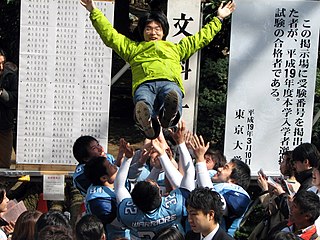Related Research Articles

Education is the transmission of knowledge, skills, and character traits and manifests in various forms. Formal education occurs within a structured institutional framework, such as public schools, following a curriculum. Non-formal education also follows a structured approach but occurs outside the formal schooling system, while informal education entails unstructured learning through daily experiences. Formal and non-formal education are categorized into levels, including early childhood education, primary education, secondary education, and tertiary education. Other classifications focus on teaching methods, such as teacher-centered and student-centered education, and on subjects, such as science education, language education, and physical education. Additionally, the term "education" can denote the mental states and qualities of educated individuals and the academic field studying educational phenomena.
A teaching method is a set of principles and methods used by teachers to enable student learning. These strategies are determined partly by the subject matter to be taught, partly by the relative expertise of the learners, and partly by constraints caused by the learning environment. For a particular teaching method to be appropriate and efficient it has to take into account the learner, the nature of the subject matter, and the type of learning it is supposed to bring about.

The General Certificate of Secondary Education (GCSE) is an academic qualification in a range of subjects taken in England, Wales and Northern Ireland, having been introduced in September 1986 and its first exams taken in 1988. State schools in Scotland use the Scottish Qualifications Certificate instead. However, private schools in Scotland often choose to follow the English GCSE system.

A standardized test is a test that is administered and scored in a consistent, or "standard", manner. Standardized tests are designed in such a way that the questions and interpretations are consistent and are administered and scored in a predetermined, standard manner.

Advanced Placement (AP) is a program in the United States and Canada created by the College Board. AP offers undergraduate university-level curricula and examinations to high school students. Colleges and universities in the US and elsewhere may grant placement and course credit to students who obtain qualifying scores on the examinations.
Educational research refers to the systematic collection and analysis of evidence and data related to the field of education. Research may involve a variety of methods and various aspects of education including student learning, interaction, teaching methods, teacher training, and classroom dynamics.
Educational assessment or educational evaluation is the systematic process of documenting and using empirical data on the knowledge, skill, attitudes, aptitude and beliefs to refine programs and improve student learning. Assessment data can be obtained by examining student work directly to assess the achievement of learning outcomes or it is based on data from which one can make inferences about learning. Assessment is often used interchangeably with test but is not limited to tests. Assessment can focus on the individual learner, the learning community, a course, an academic program, the institution, or the educational system as a whole. The word "assessment" came into use in an educational context after the Second World War.
In the Scottish secondary education system, the Higher is one of the national school-leaving certificate exams and university entrance qualifications of the Scottish Qualifications Certificate (SQC) offered by the Scottish Qualifications Authority. It superseded the old Higher Grade on the Scottish Certificate of Education (SCE). Both are normally referred to simply as "Highers".

Multiple choice (MC), objective response or MCQ is a form of an objective assessment in which respondents are asked to select only correct answers from the choices offered as a list. The multiple choice format is most frequently used in educational testing, in market research, and in elections, when a person chooses between multiple candidates, parties, or policies.
Electronic assessment, also known as digital assessment, e-assessment, online assessment or computer-based assessment, is the use of information technology in assessment such as educational assessment, health assessment, psychiatric assessment, and psychological assessment. This covers a wide range of activities ranging from the use of a word processor for assignments to on-screen testing. Specific types of e-assessment include multiple choice, online/electronic submission, computerized adaptive testing such as the Frankfurt Adaptive Concentration Test, and computerized classification testing.
Free response questions or essay questions are a type of open-ended question commonly used in schools to test students' "learning", as well as in entrance exams and sometimes as part of job application or screening processes.

Academic writing or scholarly writing refers primarily to nonfiction writing that is produced as part of academic work in accordance with the standards of a particular academic subject or discipline, including:
The educational system of Myanmar is operated by the government Ministry of Education. Universities and professional institutes from upper Burma and lower Burma are run by two separate entities, the Departments of Higher Education, whose office headquarters are in Yangon and Mandalay respectively. The modern education system is based on the system implemented during British rule in Burma. "The first Government high school was founded by the British colonial administration in 1874. Two years later, this Government High School was upgraded and became University College, Rangoon." Nearly all schools are government-operated, but recently, there has been an increase in privately funded schools. In Myanmar, schooling is compulsory until the end of elementary school, probably about nine years old. However the international standard for schooling is 15 to 16 years old.
A gobbet is a short extract from a text which is set for commentary or translation in an examination. It is also sometimes used to refer to the question containing the gobbet, or commentary itself. It is typically seen in humanities subjects such as classics, history, literature, philosophy, and religion. Gobbets differ from essays in being focused on the examination of a single text, not needing to make an argument, and often not referring to additional sources.
Advanced Placement (AP) Statistics is a college-level high school statistics course offered in the United States through the College Board's Advanced Placement program. This course is equivalent to a one semester, non-calculus-based introductory college statistics course and is normally offered to sophomores, juniors and seniors in high school.
In education, cramming is the practice of working intensively to absorb large volumes of information in short amounts of time. It is also known as massed learning. It is often done by students in preparation for upcoming exams, especially just before them. Usually the student's priority is to obtain shallow recall suited to a superficial examination protocol, rather than to internalize the deep structure of the subject matter. Cramming is often discouraged by educators because the hurried coverage of material tends to result in poor long-term retention of material, a phenomenon often referred to as the spacing effect. Despite this, educators nevertheless widely persist in the use of superficial examination protocols, because these questions are easier to compose, quicker to grade, and objective on their own terms. When cramming, one attempts to focus only on studies and to forgo unnecessary actions or habits.

The yobikō (予備校) are privately-run schools marketed to students who are taking examinations held each year in Japan from January to March to determine college admissions. The students generally graduated from high school but failed to enter the school of their choice. The test, unlike the French baccalauréat and the South Korean College Scholastic Ability Test, has different versions, with different schools looking for results from different exams. In Japan, the test is generally considered the most important event in a child's education. Students who fail may spend a year or more studying to retake the examination. They are colloquially referred to as rōnin. Yobiko are similar to juku except for differences such as curriculum, legal status, and the main type of students who attend.

An examination or test is an educational assessment intended to measure a test-taker's knowledge, skill, aptitude, physical fitness, or classification in many other topics. A test may be administered verbally, on paper, on a computer, or in a predetermined area that requires a test taker to demonstrate or perform a set of skills.
A mathematical exercise is a routine application of algebra or other mathematics to a stated challenge. Mathematics teachers assign mathematical exercises to develop the skills of their students. Early exercises deal with addition, subtraction, multiplication, and division of integers. Extensive courses of exercises in school extend such arithmetic to rational numbers. Various approaches to geometry have based exercises on relations of angles, segments, and triangles. The topic of trigonometry gains many of its exercises from the trigonometric identities. In college mathematics exercises often depend on functions of a real variable or application of theorems. The standard exercises of calculus involve finding derivatives and integrals of specified functions.

The Council for the Indian School Certificate Examinations (CISCE) is a non-governmental privately held national-level board of school education in India that conducts the Indian Certificate of Secondary Education (ICSE) Examination for Class X and the Indian School Certificate (ISC) for Class XII.
References
- 1 2 3 Heffernan, T.M. (2015). The Student's Guide to Studying Psychology. Taylor & Francis. p. 150. ISBN 978-1-317-90986-6 . Retrieved 6 May 2024.
- ↑ Spencer, M.; Spencer, J. (2016). Concentrate Questions and Answers Evidence: Law Q&a Revision and Study Guide. Concentrate Law Questions and Answers Series. Oxford University Press. p. 2. ISBN 978-0-19-871579-5 . Retrieved 6 May 2024.
- ↑ "Traditional Timed 'Unseen'/'Seen' Exam". Office of Quality, Standards and Partnerships. 17 May 2019. Retrieved 6 May 2024.
- ↑ Wireko, J. K. (2015). Does seen examination promote “deep” or “surface” learning? Pedagogical reflections on using seen examinations for student learning feedback. The Business and Management Review, 6(5), 60-67.
- ↑ Webley, L. (2016). Legal Writing. Taylor & Francis. p. 145. ISBN 978-1-317-55499-8 . Retrieved 6 May 2024.
- 1 2 Booth, A. (2013). Teaching History at University: Enhancing Learning and Understanding. Taylor & Francis. p. 132. ISBN 978-1-134-40540-4 . Retrieved 6 May 2024.
- ↑ Bach, S.; Haynes, P.; Lewis Smith, J. (2006). Online Learning And Teaching In Higher Education. McGraw-Hill Education. p. 142. ISBN 978-0-335-21829-5 . Retrieved 6 May 2024.
- ↑ Bach, S.; Haynes, P.; Smith, J.L. (2006). Online Learning and Teaching in Higher Education. UK Higher Education OUP Humanities & Social Sciences Higher Education OUP. McGraw-Hill Education. p. 141. ISBN 978-0-335-22948-2 . Retrieved 6 May 2024.
- 1 2 Brown, S.; Glasner, A. (1999). Assessment Matters in Higher Education. UK Higher Education OUP Humanities & Social Sciences Higher Education OUP. McGraw-Hill Education. p. 62. ISBN 978-0-335-23100-3 . Retrieved 6 May 2024.